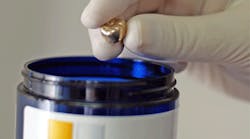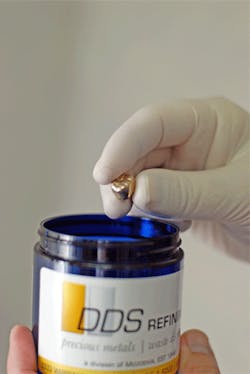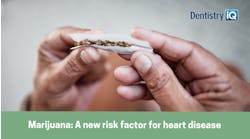A few months ago, I was in San Jose, California, to give a lecture, and I met Kevin McKay from DDS Refining. He was one of the vendors at my lecture, and I had a very enlightening discussion with him. Since buying my practice over one and a half years ago, I have had approximately 40 years' worth of boxes of cases to go through. Based on the recommendation of a local sales rep from a large supply company, I have been slowly recycling the metal from expired cases. After speaking with Kevin, I am not sure if what I have been doing is the best way to go. Keep reading for some of the things I have learned from Kevin.
Tell us about yourself and DDS Refining.
DDS Refining is a precious metal refining company that specializes in processing gold and porcelain-fused-to-metal (PFM) scrap from the dental industry. We do work with other industries that use precious metal alloys, but the dental industry is where our primary focus is.
I am currently the vice president of sales and operations and have held that position since 2009. I started in the dental refining business in 2001 and have given countless lectures on the topic since then. I have also been published several times in major dental publications.
What is the most significant change you've noticed in the refining industry in the past five years?
The most significant change has to be the increase in "cash-for-gold" operations occurring in response to gold reaching new heights in value a few years ago. The consumer marketplace was flooded with unscrupulous "cash-for-gold" dealers who preyed on the uninformed general public. Coincidentally, patients suddenly displayed an unprecedented interest in getting their gold back from their dentists. These same opportunistic dealers saw the chance to target the dentists themselves, expanding the unfavorable practice of "weighing and paying."
Why is "weighing and paying" unfavorable to dentists?
What most dentists do not realize is that they are typically getting less than 50% of the actual value of their scrap when they opt for the "weigh and pay" approach. When someone is just putting scrap metal on a scale to determine the weight and then guessing the value with no knowledge of the alloy breakdown of the crowns, it's imprecise. No matter how long a so-called expert has been guesstimating the value of scrap metal, it is impossible to know the true content because of the wide array of alloys used in dental prosthetics. Not surprisingly, dentists are consistently shortchanged when this practice is used.
How can dentists best capitalize on their scrap metal?
By sending their scrap metal to be refined, dentists can learn the precise elemental breakdown of the metal contained in the scrap. The rigorous technical process of smelting and assaying undertaken during refining is the only way to accurately determine the full value of a scrap lot.
Can you elaborate on how and why the refining process provides more accurate valuations?
When dentists send their scrap metal to DDS Refining, we log each lot of scrap individually and assign it a unique lot number for easy tracking. We then prepare the scrap to be smelted by adding several chemical substances to it. The addition of borax and soda ash effectively creates a "holding slag," where all the impurities that don't burn off are captured when they separate from the metal. Copper is usually added as well, primarily to help alloy the different metals. When done properly, the smelting process provides us with a homogeneous bar that is free of anything nonmetallic. This is key because we can then take a small representative sample of the bar to perform the assay.
The assay is the process of determining the actual elemental makeup of the whole bar. For example, let's say the bar weighs 10 troy ounces (oz t). If the assay shows the composition to be 50% gold, 25% palladium, 10% silver, and 5% platinum, with the remaining metals being copper and trace amounts of other nonprecious metals, we would be able to determine that the bar as a whole contains exactly 5 oz t of gold, 2.5 oz t of palladium, 1 oz t of silver, and 0.5 oz t of platinum.
Obviously, with the wide variations in dental alloys' compositions, the true value of a given lot can only be determined by this technical process. It is simply not possible by casually "weighing and paying."
How do you envision the future of the precious metals market?
No two experts can agree where the values of precious metals are going to go. Four years ago, gold was trading at just under $1,800 per ounce, near its all-time high. It is now closer to $1,100 per ounce. Palladium was trading near $700 per ounce, whereas now it's just under $500. Will the market go back up? And if so, when? Nobody can say for certain.
However, the uncertainty of the precious metals market should not deter dentists from having their scrap metal refined. One way of addressing concerns about market volatility (which many dentists may not have considered) is to accept payment in gold or silver bullion, rather than cash or check, which can then be held until the most advantageous economic climate. This way, they can get the processing step out of the way and be in a position to capitalize on their holdings at the time of their choice.
In summary, then, no one can guarantee what the future will hold for the precious metals market. The only guarantee that you can take to the bank is to use a reputable precious metals refinery to get the best return for your scrap metal.
For a free scrap kit with a prepaid, insured UPS label, call (630) 799-8214. To learn more about DDS Refining, visit ddsrefining.com.
Editor's Note: This article first appeared in Pearls for Your Practice: The Product Navigator.Click here to subscribe. Click here to submit a products article for consideration.
Kevin McKay is the vice president of sales and operations for DDS Refining.
Pamela Maragliano-Muniz, DMD, is an editorial director for Pearls for Your Practice: The Product Navigator, an e-newsletter from DentistryIQ and Dental Economics. She was a dental hygienist before earning her DMD from Tufts University School of Dental Medicine and her certificate in advanced prosthodontics from the UCLA School of Dentistry. She teaches and also maintains a private practice in Salem, Massachusetts. Her passion for prevention has stayed with her throughout her career, and in 2010 her practice was named the Adult Preventive Care Practice of the Year by the American Dental Association.







